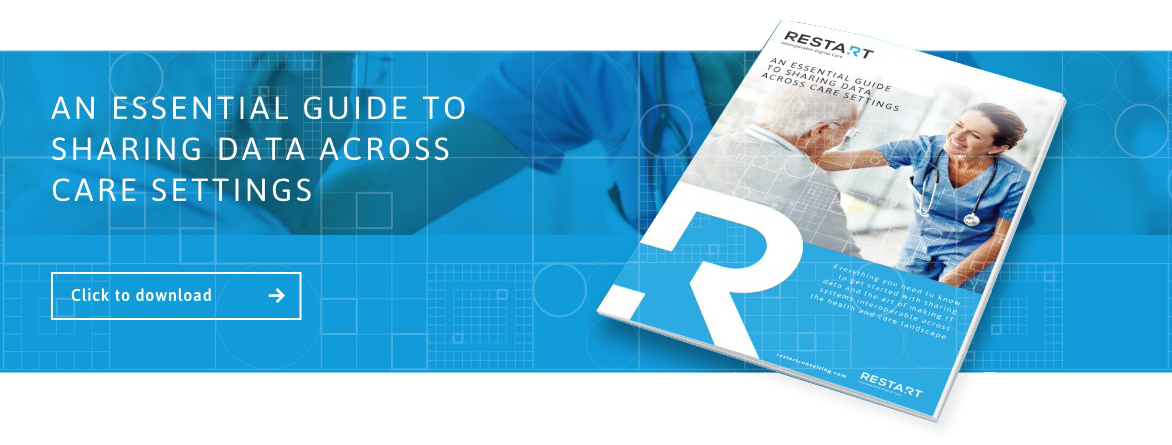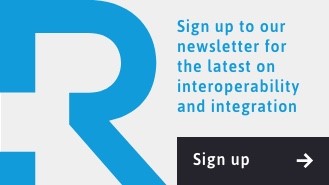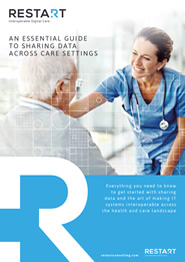Building Strong Interoperability Partnerships Throughout the NHS Ecosystem
The way individuals and organisations throughout the NHS and the wider care community have collaborated over the past 18 months has provided a clear future direction. We have seen the value of strong interoperability partnerships both within a Trust and across a wide health and care community in enabling individuals and organisations to reshape the way care is provided.
As the NHS accelerates this collaboration, partnerships are becoming ever more important in providing individuals at every level with access to the information required to improve the quality and timeliness of service delivery.
As the recent policy paper from the Department of Health & Social Care states, “Data partnerships are central to accelerating opportunities for innovation. Over recent years, the UK has seen the growth of multidisciplinary innovation, with collaboration between health and care partners, academia, and industry, occurring at increasing scale and pace.”
In this blog, we explore the concept of interoperability partnership to meet digital objectives and consider the many new stakeholders that must now be active participants in every interoperability strategy.
Tactical and Strategic Partnerships
It is now widely accepted that strong partnerships underpin effective collaboration – both within a Trust and outside with the wider health and care community. We have seen the power of tactical and strategic cooperation to support a rapid extension of data sharing, such as at the beginning of the Covid-19 pandemic when different clinical teams required immediate access to patient data to support fast diagnosis and treatment plans. In an increasingly patient-centric model, collaboration ensures clinical teams are empowered to work together to deliver complex care matched to each patient’s needs.

Building on Best Practice: Interoperability partnerships
As the ‘Data saves lives: reshaping health and social care with data’ report confirms, local health and care organisations have opportunities to work with innovators directly to create new digital services. The direction is clear – but how can organisations build the strong partnerships required to realise a goal of data-driven health and care community underpinned by strong collaboration?
There are two vital aspects to consider – working with stakeholders and working with suppliers.
1. Including stakeholders at every step
Every organisation delivering health and community care is at a different stage in its digital transformation journey, and they are now also exploring opportunities to collaborate with an ever-expanding number of partner organisations. Within each organisation, different stakeholders will have varying levels of digital confidence, knowledge, and ambition. It sounds hugely challenging, but it is vital to include these individuals on this journey to ensure their needs, expectations and concerns are recognised and addressed.
The underlying goals of every interoperability strategy are the same; to provide the right data to the right people at the right time. Increasingly, this right data will support clinicians and administrative teams and patients who are being encouraged to take more responsibility for self-care and managing their conditions using digital tools such as flash glucose monitoring for patients with Type 1 Diabetes. Interoperability projects must also include population health data, which, as we have seen over the past 18 months, can play a vital role in identifying health and care crises, helping clinicians prioritise and target care.
It is very important to put in place communication strategies. You need dedicated individuals with good skills able to tease out the particular information needs of stakeholders and provide regular updates across the wider community about the progress of interoperability projects. These projects will deliver benefits to both staff and patients. Setting clear targets, combined with effective communication will transform understanding, commitment and buy-in.
2. Managing a supplier ecosystem across the NHS
Organisations across the health and community care sectors increasingly recognise the importance of supplier relationships to meet interoperability goals and achieve this vision of wider collaboration. Each supplier relationship will be different – and, with some, the transaction will be nothing more than the procurement of a product or service. Interoperability, however, demands more.
The digital landscape is constantly changing, creating new opportunities to explore and assess. In addition, health and care services create incredibly complex data requirements, which means organisations require a partner with the right skills and experience and a clear understanding of an organisation’s goals.
A good integration expert will work alongside the existing IT team to understand requirements and help to define architecture before managing deployment and outlining future enhancements. The partnership should also help IT departments manage the huge pressure on internal resources. By outsourcing to a trusted partner, organisations can gain access to interoperability expertise, knowledge sharing and mentoring to ensure the entire team gains increasing confidence in its own ability to deliver complex data needs.
It’s essential to find a supplier with the flexibility to work within an organisation’s existing models for project discovery and delivery. Plus, of course, if care is delivered 24/7, it is also vital to make sure support is there when required – in the right time zone. It’s also essential to consider a supplier’s partner ecosystem. Some suppliers still retain a closed attitude to collaboration and data sharing; they have failed to embrace the Open Technology approach and use of open Application Programming Interfaces (API) that are the foundation of data sharing and collaboration. Suppliers that evidence a strong ecosystem of partners, also demonstrate their understanding of, and commitment to, delivering a thriving integrated care system.
Conclusion: Interoperability Partnerships
Strong interoperability partnerships with stakeholders and suppliers across the NHS ecosystem are crucial, with the expected cost saving and improvement in patient outcome also supported by better career opportunities for staff. As Dr Graham Evans, Chief Digital Officer, North East and North Cumbria ICS, said, “the challenge to achieving real integration and interoperability is 10% technical and 90% everything else – people, process, culture and organisation.”
Building on the proven best practice already achieved with strong partnerships will provide opportunities throughout the NHS to realise the power of collaboration to transform patient care.
Want to know more?
We’re here to partner with NHS stakeholders and suppliers to meet digital objectives in any interoperability strategy, including deploying shared care records or joining up systems, new or existing. Here’s a few examples of our interoperability partnerships:
- South London and Maudsley NHS Foundation Trust (SLaM) chooses ReStart to provide interoperability solutions
- ReStart and Better announce partnership to improve data interoperability within the NHS
- ReStart Links North Tees and Hartlepool to the Great North Care Record
- Guy’s and St Thomas’ NHS Foundation Trust (GSTT)
Please get in touch, and we’ll connect you with one of our technical experts for free discovery consultation.
For more information about how interoperability is helping organisations across the NHS meet data sharing objectives download our eBook: An essential guide to sharing any data across any care setting. Including a free checklist to assess the level of data sharing within your organisation.



